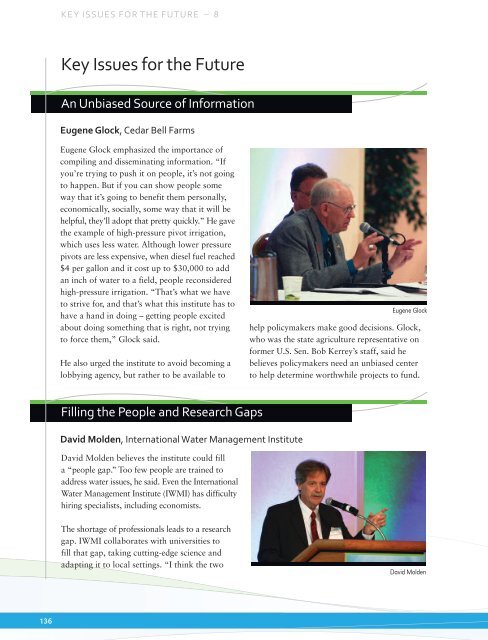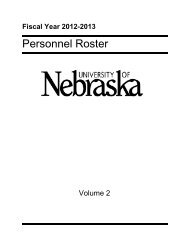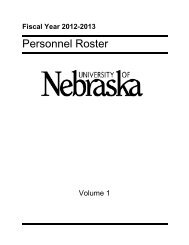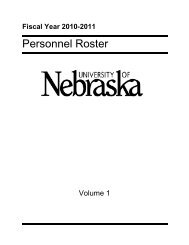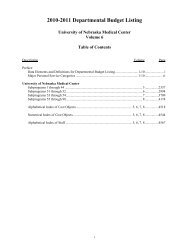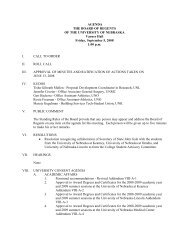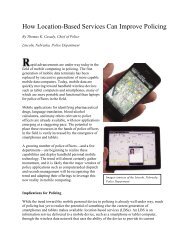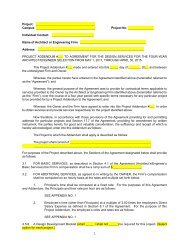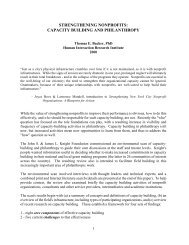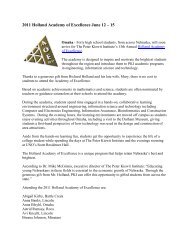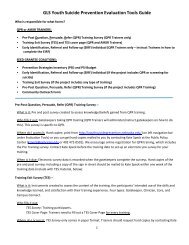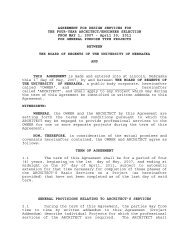Full Version - Water for Food Institute - University of Nebraska
Full Version - Water for Food Institute - University of Nebraska
Full Version - Water for Food Institute - University of Nebraska
You also want an ePaper? Increase the reach of your titles
YUMPU automatically turns print PDFs into web optimized ePapers that Google loves.
136<br />
KEY ISSUES FOR THE FUTURE 8<br />
Key Issues <strong>for</strong> the Future<br />
An Unbiased Source <strong>of</strong> In<strong>for</strong>mation<br />
Eugene Glock, Cedar Bell Farms<br />
Eugene Glock emphasized the importance <strong>of</strong><br />
compiling and disseminating in<strong>for</strong>mation. “If<br />
you’re trying to push it on people, it’s not going<br />
to happen. But if you can show people some<br />
way that it’s going to benefit them personally,<br />
economically, socially, some way that it will be<br />
helpful, they’ll adopt that pretty quickly.” He gave<br />
the example <strong>of</strong> high-pressure pivot irrigation,<br />
which uses less water. Although lower pressure<br />
pivots are less expensive, when diesel fuel reached<br />
$4 per gallon and it cost up to $30,000 to add<br />
an inch <strong>of</strong> water to a field, people reconsidered<br />
high-pressure irrigation. “That’s what we have<br />
to strive <strong>for</strong>, and that’s what this institute has to<br />
have a hand in doing – getting people excited<br />
about doing something that is right, not trying<br />
to <strong>for</strong>ce them,” Glock said.<br />
He also urged the institute to avoid becoming a<br />
lobbying agency, but rather to be available to<br />
Filling the People and Research Gaps<br />
David Molden, International <strong>Water</strong> Management <strong>Institute</strong><br />
David Molden believes the institute could fill<br />
a “people gap.” Too few people are trained to<br />
address water issues, he said. Even the International<br />
<strong>Water</strong> Management <strong>Institute</strong> (IWMI) has difficulty<br />
hiring specialists, including economists.<br />
The shortage <strong>of</strong> pr<strong>of</strong>essionals leads to a research<br />
gap. IWMI collaborates with universities to<br />
fill that gap, taking cutting-edge science and<br />
adapting it to local settings. “I think the two<br />
Eugene Glock<br />
help policymakers make good decisions. Glock,<br />
who was the state agriculture representative on<br />
<strong>for</strong>mer U.S. Sen. Bob Kerrey’s staff, said he<br />
believes policymakers need an unbiased center<br />
to help determine worthwhile projects to fund.<br />
David Molden


